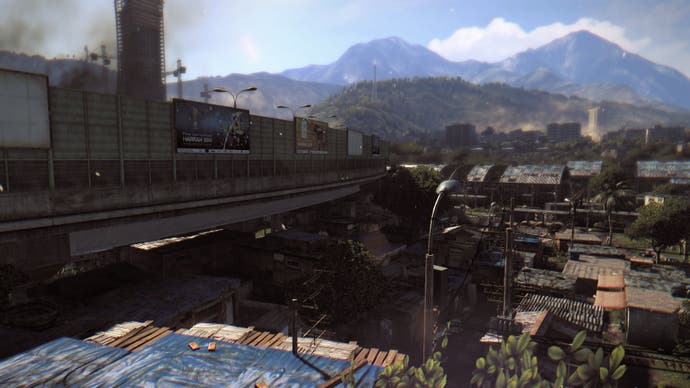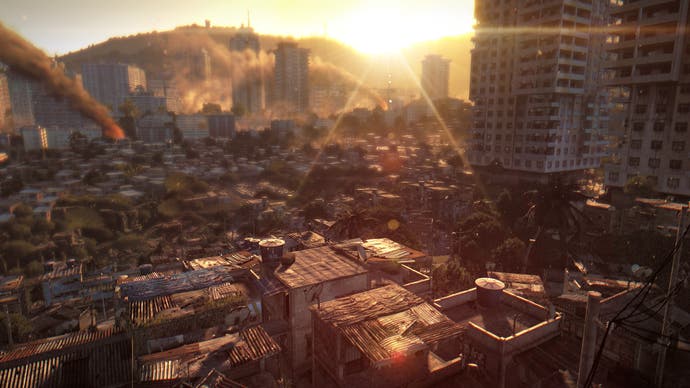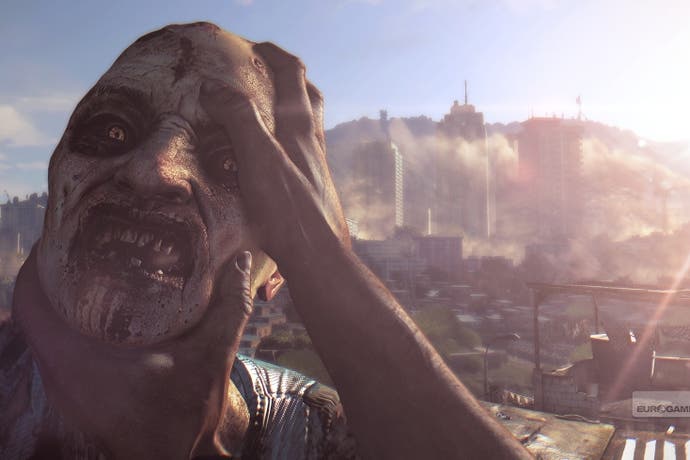How Dying Light's everything Dead Island could have been
And, perhaps, was going to be.
When Riptide released 18 months after the original Dead Island, there was some cause for concern; Techland, a developer not necessarily renowned for the quality of its output, seemed to be pushing itself too far. Those fears were borne out by a sequel that papered over some of the cracks but couldn't overcome the shabbiness at the heart of the original design. When Techland announced another first-person zombie game a mere month after Riptide's release, mere weeks since it announced an all-new game and mere days after the release of a new Call of Juarez, it's understandable those same concerns rise again.
The Polish developer's got an answer to those worries, of sorts. This isn't a Dead Island game, at least not as far as it's willing to admit. It is instead the product of the team's top-tier talent, and is the most ambitious project it's undertaken to date.
"Gunslinger's done, and the Warsaw studio's done with Riptide," says Techland's Blazej Krakowiak. "Now we're working on this - the biggest game in the studio's history, and the perfect opportunity at the beginning of the next generation - and HellRaid. That's it. Obviously we have other stuff cooking, but that's it for now."
"Sometimes we have something cooking for a long time in pre-production, and then we move to full steam ahead and the game gets done. We know how to do it, and we have to do it - we work with different publishers, we have our own engine and we have our own art team etc. It's good to have several projects - because when the art's done that team can move on to another project."
All of which goes some way towards explaining how a 250-strong independent studio can churn through so much in so little time, but doesn't really explain why its latest melee-based first person zombie game doesn't bear the Dead Island moniker. "Dead Island is Deep Silver's IP," says Krakowiak. "You have to ask them about that" - we did, and they declined to comment - "but we are proud of what we've achieved, how that game's introduced some very interesting concepts, but we're focusing on this one."

"One thing that needs to be said is that I don't know anything about any Dead Island sequels," Krakowiak continues. "Riptide, we always called it the next installment and that's it. The difference is small and important to us. As far as this one's concerned, in 2012, when Dead Island was done, the biggest team that we had in the studio they wanted to try something new. They learned a lot working on all our games, and they are never satisfied with what they have."
There's good reason why Techland's developers weren't satisfied with what they had. For all its boisterous, energetic charm, Dead Island was a scrappy, often ugly mess. First impressions of Dying Light put some of those fears to rest: this is an attractive, coherent take on the zombie genre, and one that looks to offer plenty more than just cheap thrills.
It helps that it's being shown on a high-end PC, in a vision that's set to reflect the target being set for PlayStation 4 and Xbox One versions. Looking out upon the slum that's part of Dying Light's open world - the tropics of Dead Island having been replaced with a more downbeat but no-less sunny clime - the detail astounds. The shanty huts reach out into the distance until, at some point near the horizon, they blossom into a cluster of tall tower blocks, and when a plane swoops through the skies with its engines ablaze, the trees all sway convincingly under the drama of it all.
And once the scene's stopped being admired Dying Light impresses again, the player moving urgently across the rooftops as they scramble to investigate the scene of the inevitable plane crash. It's more than just a tweak of the slow, trudging walk that made playing Dead Island feel like wading through treacle: it's a part of Dying Light's key new feature, dynamic traversal, an addition that adds as much to the zombie genre as it lifts from Mirror's Edge.
"This is something we felt was missing from zombie games," says Krakowiak. "You're human, smart and agile and you can just jump over chest-high walls and maybe climb over stairs. We want to give players the actual advantage that people always see in movies, in comic books. You can climb rooftops, you can explore interiors of buildings, there's a huge seamless city - well, you really have to go a long way until you see a loading screen."
In practice, it's fluid, dynamic and promises athletic exploration. Telegraph poles can be shimmied up to reach high-up platforms, and overhanging awnings can be grabbed and clambered up. Traversal skills can be upgraded, to a degree - unlike Dead Island there are no set classes, just a set of skills you can choose and specialize in - but from the off there's an impressive and far-reaching set of basic skills.

It's in zombie encounters that it really comes alive. The melee-based combat of Dead Island returns, as does the ability to craft and upgrade weapons, but the most impressive tool in the player's arsenal is now their agility. When hordes attack it's possible to beat a retreat, scrambling up the sides of buildings as undead fingertips grasp at their heels. Find yourself fleeing from enemies and it's a feature that's pushed into subtly different territory. There's an ability to glance back over your shoulder with a single-button press, as well as sliding under gaps in walls making escape a dynamic, potentially thrilling event.
Escape's an option you're more likely to pursue when the dark sets in, and there's a full day/night cycle in place in Dying Light. By day it's a relatively sedate open world you can explore - there are undead, sure (and in one jaw-dropping scene there literally hundreds of them milling about a motorway in a moment as impressive today as Dead Rising was all those years ago) but they're less lethal, and the real threat comes from some of the hostile human factions on patrol.
By night it's a brilliantly scary, dangerous place, the shantytown stirring with groans and screams as the more dangerous zombie types come out to play. There's slightly more stealth required, and a sense of more traditional horror to the exploration, but Techland insists that this will still be an action-focused game - it's only that now the action seems a little smarter and a lot less schlocky.
Will it be just as buggy as what Techland's produced before? That's harder to say after only seeing a tightly controlled vertical slice. "It's on a new engine built for the next gen," assures Krakowiak as he talks about Chrome 6, Techland's internally developed engine. "It's our biggest and best team that's been working on the game for a long time. And we also believe the expertise from Warner Bros, they'll all be factors to ensure this is the best game we've created."
It's hard to get too excited about that statement when it's coming from a developer with such a patchy record, but there's enough in an early taste to suggest that Dying Light will fulfill that promise. Maybe it's enough to allay some of those fears, too, and enough of a foundation for Techland to make a game that lives up to initial expectations of the first Dead Island.

